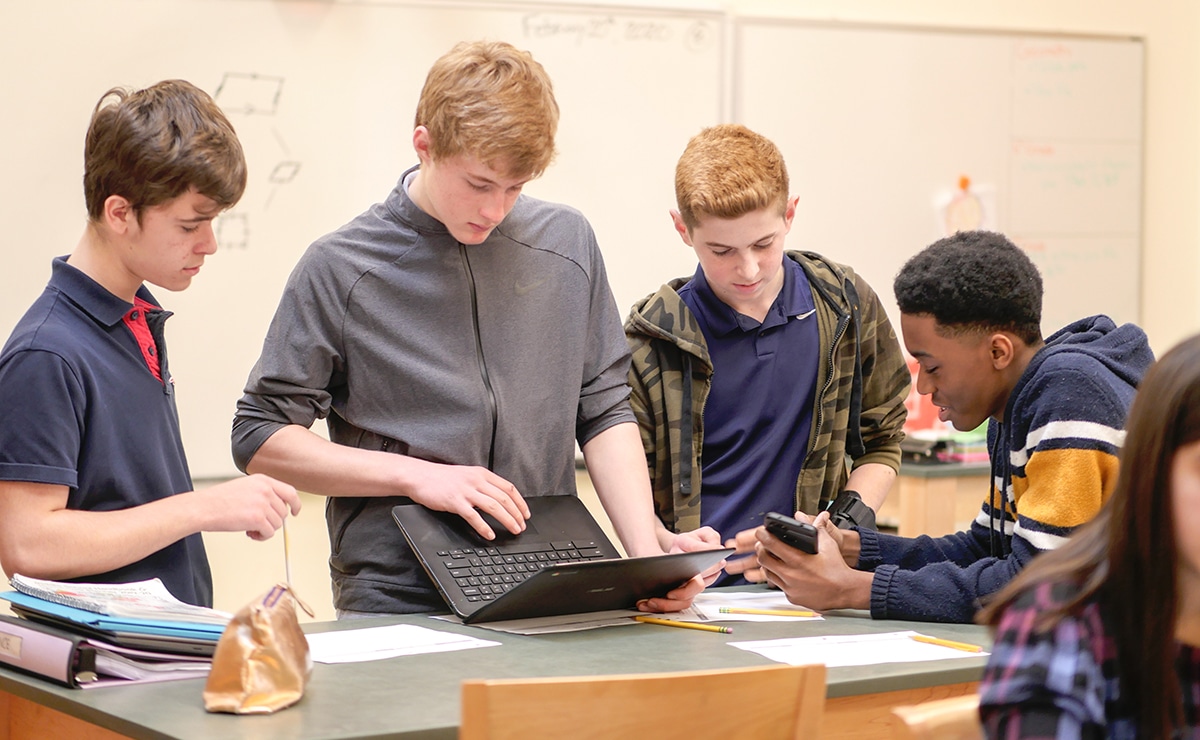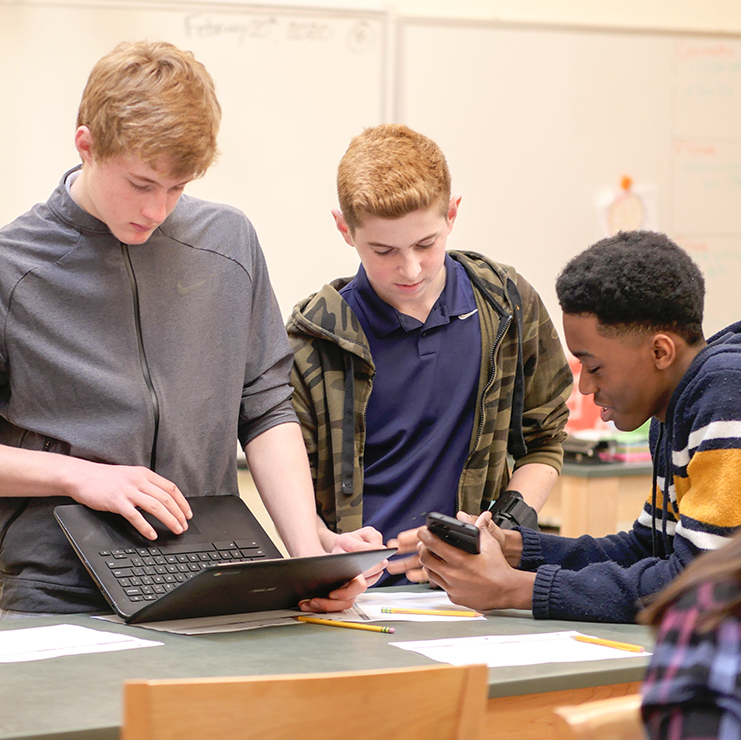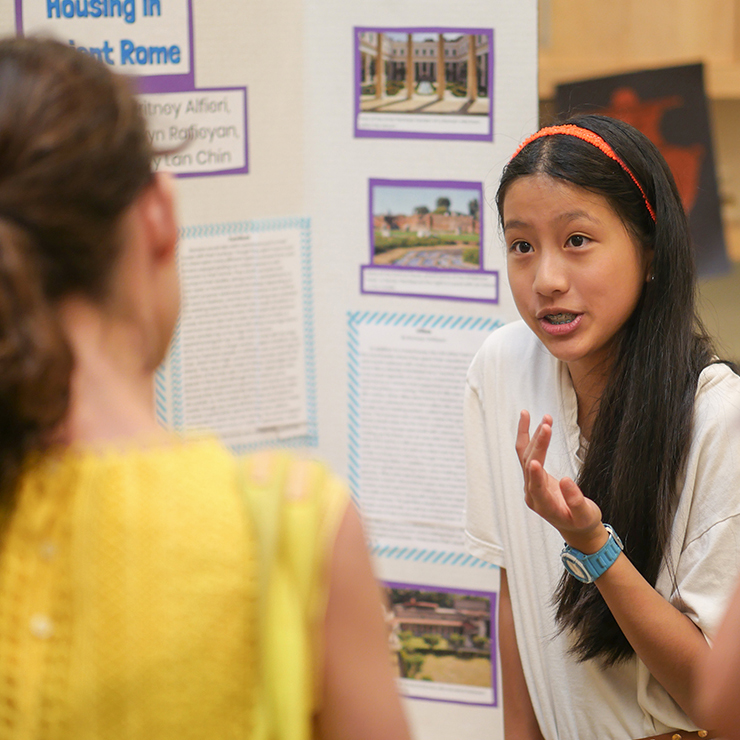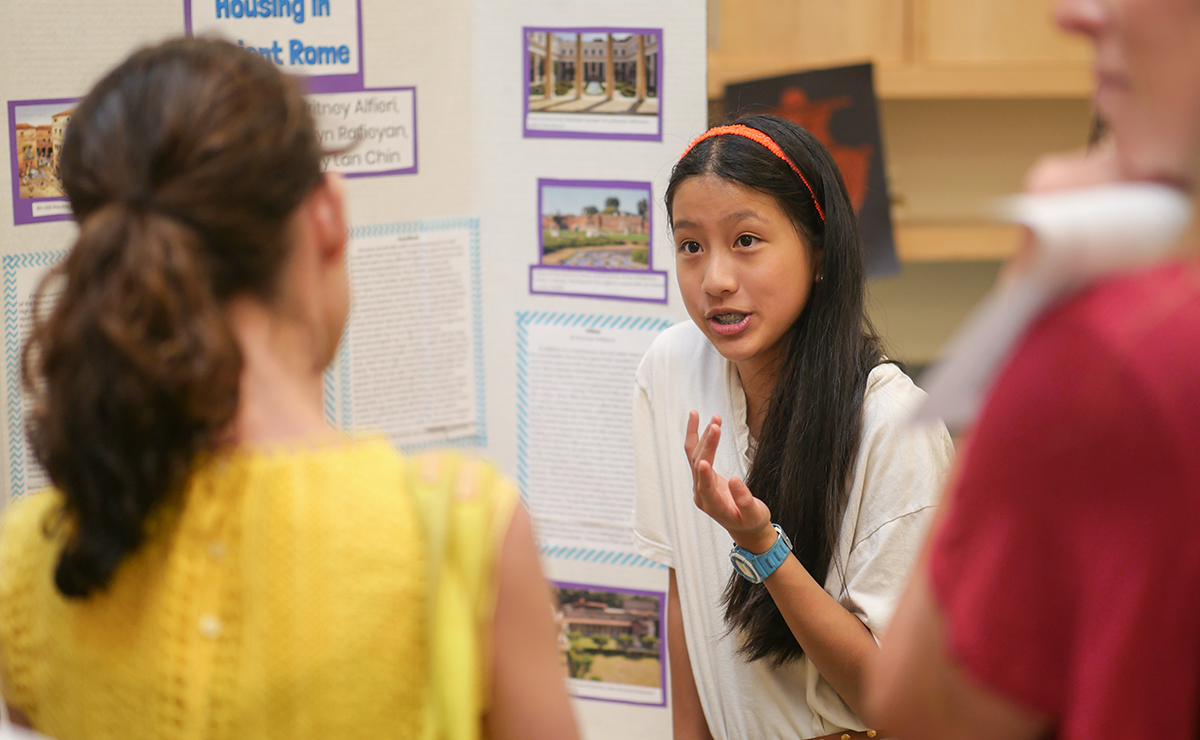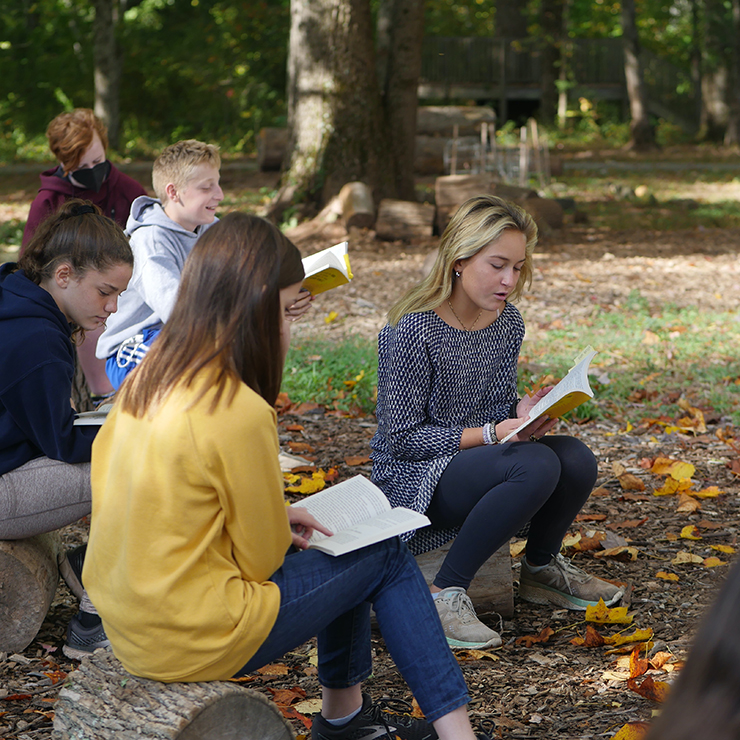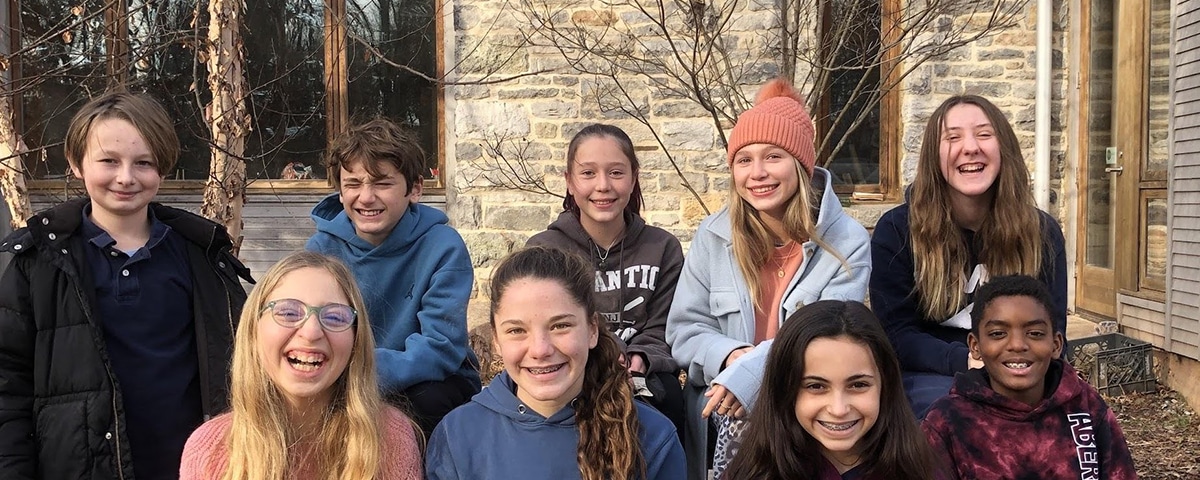
Middle School
Grades 6-8:
The three middle school years (Grades 6-8) are formative years. A nurturing, growth-oriented school environment that emphasizes character development and self-discovery as much as academic achievement makes all the difference at this age. At Willow, we help middle school students realize their full potential, in the classroom and beyond. Here, middle schoolers are known by faculty members, administrators, and students across every grade, establishing them as school leaders and role models to younger children. By the time they reach Grade 8, our students have led Morning Gatherings, initiated multiple service projects, and built confidence and communication skills through our unique virtues program. In their final year at Willow, our students reflect on who they are and who they want to become. Willow’s middle school program gives our students the strong foundation they need to tackle challenges and advocate for themselves in high school and beyond.
Your child will have true opportunities for intellectual and personal growth in Willow’s middle school. Our team of educators work together to challenge, nurture, mentor, and encourage middle school students in various ways: First, we ensure they can demonstrate a deep understanding of the interdependence of all living things and their role in our world. Second, we help them explore their passions through a number of middle school electives and our student-centered approach that empowers them to bring their interests into their lessons. Finally, we encourage the daily practice of kindness, respect, courage, compassion, and other attributes that the entire Willow community lives by through our virtues program.
Explore more about our program
Skills for Tomorrow
At Willow, students aren’t just taught facts and figures – they learn skills that will help them navigate their education and problem-solve and advocate for themselves throughout their lifetime. Eighth graders take a special Skills for Tomorrow class where they learn how to build resumes, hone their interviewing skills, understand daily finances and budgeting, and more. They further develop their leadership skills by preparing for and completing an internship, organizing several fundraising events, creating a capstone documentary video, and writing personal reflections for their graduation ceremony.
Social Studies
The social studies curriculum at Willow is unique. Founded on the principals of systems thinking and a student-centered approach, students explore big ideas about human interactions, values, and choices, and leave the class with a deeper understanding of multiple perspectives throughout history and today. Our goal is to prepare students for global citizenship in a diverse society by giving them the tools to research complex issues, discuss difficult topics, and lead with compassion and understanding.
English
Willow’s Middle School English program incorporates and expands upon the Writer’s and Reader’s Workshop approach that students employ in elementary school. While middle schoolers are prepared for high school with increasingly more structured assignments as they progress through the years, they are encouraged to be creative, take ownership in their topics and themes, and learn the writing process through thinking, planning, sharing, editing, and revising. Students also choose their own independent reading books and host their own book club discussions, creating talking points, taking turns acting as the leader, and thinking deeply about what they’ve read and how it applies to their own lives.
Take a Deeper Dive into our Curriculum
Dummy to Close First Accordion
Sixth Graders are...
Beginning Middle School! By sixth grade, differences among individuals in rates of development widen. For many, the adolescent growth spurt has begun. It is a time of extremes. Children may be very active, but also need more rest – sleep is very important. While their intellectual interests expand, students remain mostly interested in the present. They begin to question what they are told, but their outlook is mostly idealistic.
In Grade 6, Willow’s curriculum takes advantage of students’ heightened problem-solving skills and understanding of abstract thought. Here are some examples:
- Algebraic reasoning, measurement and geometry, and probability are studied in math. Some students are ready for pre-Algebra in Accelerated Math. These students study rational numbers, graphs, equations, and exponents and roots.
- Students discover the formation of the Earth and delve into its natural systems, including geology, hydrology, nutrient cycles, energy flow, weather, climate change, and human impact in science. The campus is their classroom as they design and implement experiments.
- In language arts, students explore various types of writing, including analysis, reflection, and journaling. Young adult novels, as well as short stories and essays, serve as a springboard for class discussion and writing assignments. Independent reading helps students learn the art of deep reading. Students are introduced to MLA formatting and opportunities to shape their voices as writers through exercises in self and peer editing, revision, and grammar review.
- In social studies, students study the Age of Empires. Focusing on China, India, Greece, and Rome, they investigate why empires rose to power and how they impacted the lives of ordinary people and the course of human history. At the end of the year, students create an interactive exhibit and invite visitors to take a tour of ancient Rome.
- Latin becomes part of the curriculum for all students through the Cambridge Latin Course series, while French and Spanish instruction branch into study of the countries where those languages are spoken, as well as introduction of formal grammar through writing, speaking, and reading in the target language.
- Students are encouraged to express themselves and try new ideas as they build on their lessons in other subjects in Willow’s integrated art program as they strengthen their ability to collaborate with each other in music.
- Sixth grade students are given the opportunity to pursue their passions through a number of elective choices, from Guitar to The Science of Cooking, Form & Forage, and more.
After they have completed their first year in Middle School, Willow sixth graders show an ability to:
- Design experiments and understand the scientific process.
- Persevere when presented with solving challenging problems and learn from mistakes.
- Draw conclusions based on primary and secondary sources and support them with evidence.
- Use systems thinking tools to predict long-term, unintended consequences of decisions and events.
- Understand the importance of cultivating the virtues of honesty and justice.
Seventh Graders are...
Immersed in a period of rapid intellectual, social, and emotional change. While there are even more social distractions to keep them from doing schoolwork, at the same time, individual skills and interests can lead to great opportunities to explore and develop lifelong passions.
In Grade 7, the curriculum is rigorous and varied. The Virtues Program and a strong sense of community help Willow students navigate social and emotional changes.
- Students focus on life science, observing plant life cycles, exploring molecules (including DNA), and studying ecosystem dynamics and evolution. Students experience real biology field work, including a year-long, experiential study of plants on Willow’s campus and a citizen science study of bird migration patterns and population.
- In math, Pre-algebra or Algebra 1 demand that students reason abstractly and quantitatively, construct viable arguments to explain their reasoning, solve problems accurately, use appropriate tools strategically, and persevere when solving challenging problems.
- In language arts, students deepen their critical thinking and analytical writing skills as they begin to study a more nuanced approach in their written expression: paying attention to how we say what we say. The emphasis on MLA formatting and grammar continues, as well as independent reading opportunities. Students are introduced to the concept of cultural literacy, highlighting the importance of reading and intelligently discussing well-known and influential works.
- In Latin, seventh graders continue with the Cambridge Latin Course series, Unit 1 and participate in the National Latin Exam, Introduction to Latin.
- In French and Spanish, emphasis is put on more advanced written and oral comprehension through a project-based curriculum.
- Social studies explores the value of diversity and the attitudes that lead to positive or negative cultural encounters. Contacts between the Christian and Islamic worlds, imperial China, and cultures along the Silk Road during Medieval times are the focus of a year-long investigation into cultural exchanges, culminating in a final, student-led interactive exhibit.
By the end of the year, these are just a few of the many skills and abilities Willow seventh graders demonstrate:
- A “growth mindset,” as students are able learn from their mistakes.
- An understanding that many of the issues we struggle with today were present long ago in both western and eastern cultures.
- An ability to compare and contrast based on similarities and differences.
- The ability to craft multiple paragraph essays that support ideas and opinions through textual evidence and to cite that evidence using both in-text citations and work cited pages.
- An understanding of the need for empathy, compassion, and forgiveness in solving conflicts.
Eighth Graders are...
Capable of making great leaps in problem solving, deductive reasoning, abstract thinking, strategic planning, and impulse control. They are beginning to understand that their behavior can have long-term consequences. With growing self-awareness, students are open to building lifelong skills, such as proactivity, perseverance, goal setting, using a support system, and developing emotional coping strategies.
The Grade 8 curriculum ties together all of the programs of the previous years at Willow to match students’ more advanced cognitive skills:
- Algebra 1 or geometry — both high school-level courses — present challenges and opportunities for future success in math.
- Students take ownership for developing and performing experiments as they explore physical science and chemistry. They practice the engineering design process as they work on projects to model the laws that govern energy and matter.
- American history is the basis of the social studies curriculum, leading students to investigate the questions, “What future do I want to create?” and “How much power do ordinary people have to change the world?”
- In language arts, students continue to develop their skills to produce longer, more comprehensive writing on a variety of topics in a variety of modes. Students read seminal and influential novels, short stories, essays, and poetry. The emphasis on independent reading continues, with stronger focus on reflective writing to prepare for similar high school assignments. When they reach high school, Willow graduates are recognized as effective and confident communicators.
- Skills for Tomorrow builds public speaking, communication, and leadership skills in preparation for high school.
- In Latin, eighth graders continue with the Cambridge Latin Course series, Unit 2 and participate in the National Latin Exam, Latin I.
- In art, students collaborate on a special class banner to be presented at graduation and hung in the Willow barn with previous graduating classes.
By the end of the year, Willow eighth graders are fully prepared to tackle the challenges of high school, demonstrating:
- An ability to speak and write in creative and thoughtful ways.
- A deep understanding of the interdependence of all living things and the role humans play in it.
- An insight into how individuals contribute to positive change and what it means to be a citizen in a democracy.
- Self-awareness, leadership, a motivation to pursue excellence, and more!
